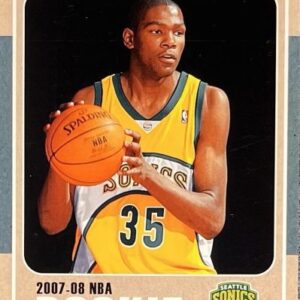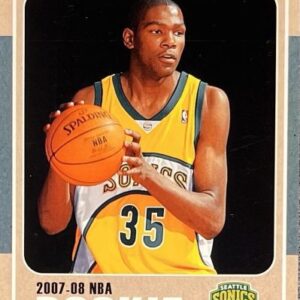In the pantheon of basketball legends, few names are as revered as Julius Erving, also known as “Dr. J.” His 1972 Topps rookie card captures the dawn of an era that would forever change the landscape of professional basketball. This card not only signifies the beginning of a storied career but also stands as a treasured artifact that encapsulates the extraordinary achievements of one of the game’s greatest players.
The 1972 Topps set greeted collectors with its bold design and vibrant colors, but no card in the series was more coveted than Erving’s rookie card, number 195. It depicts a young Erving in his Virginia Squires uniform, a team he played with before his storied NBA career. The card’s simple design, featuring Erving mid-jump shot with a ball in hand, is offset by the bright orange and yellow background, making it a standout piece of memorabilia.
In today’s market, a high-grade example of this card is a prize for any collector. Its value has steadily climbed, a testament to Erving’s enduring legacy and the deep nostalgia for the era he defined. The card’s desirability is not merely a reflection of monetary worth but also of the profound impact Erving had on the sport.
Julius Erving’s journey in professional basketball began in the ABA with the Virginia Squires and the New York Nets before he leaped into the NBA with the Philadelphia 76ers. His career accomplishments are nothing short of extraordinary. Erving was a wizard on the court, known for his grace, athleticism, and creativity. He revolutionized the forward position and became an icon of the sport, inspiring a generation of players.
Erving’s accolades are extensive: an NBA championship in 1983, two ABA championships, four MVP awards, and 16 combined All-Star appearances in the ABA and NBA. He was an innovator of the modern style of play, influencing the game with his artistry and athleticism. Dr. J’s aerial prowess and flair on the court captivated audiences, making him one of the most exciting players to watch.
In 1993, Julius Erving was inducted into the Basketball Hall of Fame, a fitting tribute to his impact on the game. His induction speech reflected on his journey, his love for the game, and his respect for the players who came before and after him. The Hall of Fame induction solidified his status as one of the game’s all-time greats.
Even decades after his retirement, Erving is still celebrated as one of the best dunkers the game has ever seen. His slam dunks were not just scoring maneuvers but artistic expressions that brought fans to their feet. Erving’s style and grace in the air changed the slam dunk from a mere show of power into a balletic spectacle that became a hallmark of his playing style.
Julius Erving’s influence transcended the hardwood floors of basketball arenas. He became a cultural icon, with his on-court style and off-court demeanor capturing the essence of coolness and professionalism. He was more than a basketball player; he was a trendsetter, a role model, and an ambassador for the sport.
The significance of Erving’s 1972 Topps rookie card goes beyond the player it depicts. It represents a piece of history from an era when basketball was undergoing a transformation, and Erving was at the forefront of that change. The card is a snapshot of the past, a tangible connection to the legacy of one of basketball’s greatest influencers.
As a collectible, Erving’s rookie card has shown significant investment potential. Its value has seen a substantial increase over the years, mirroring the growing interest in vintage sports memorabilia. Collectors and investors alike recognize the worth of owning a piece of history that carries both sentimental and monetary value.
For those fortunate enough to possess this card, its preservation is paramount. Protective casing, proper storage, and occasional professional grading ensure that the card remains in optimal condition. As with all paper collectibles, the card’s state of preservation can significantly affect its value.
The 1972 Topps Julius Erving rookie card is more than just cardboard—it’s a symbol of basketball’s rich history and the indelible mark left by Dr. J. As collectors seek out this card, they’re not just acquiring a piece of sports memorabilia; they’re paying homage to a player who redefined what it meant to be a professional basketball player. Erving’s legacy, cemented in the Hall of Fame and in the memories of basketball fans worldwide, will continue to live on, with his rookie card serving as a lasting tribute to his remarkable career and contributions to the game.





